La Trobe University LST2BSL Business Law & Ethics Case Study
VerifiedAdded on 2023/06/13
|7
|1191
|202
Case Study
AI Summary
This document presents a case study solution for a Business Law and Ethics assignment, likely from La Trobe University. It addresses four legal issues: the validity of a contract when replacing a party, the applicability of promissory estoppel, the enforceability of a restraint of trade clause, and entitlement to an offer in a unilateral contract. Each issue is analyzed by stating the relevant legal rule, applying it to the facts of the scenario, and drawing a conclusion. The analysis references case law to support its reasoning, focusing on contract formation, intention to create legal relations, promissory estoppel requirements, and the conditions for enforcing restraint of trade clauses. The document concludes with a bibliography of cited cases. Desklib provides access to similar solved assignments.
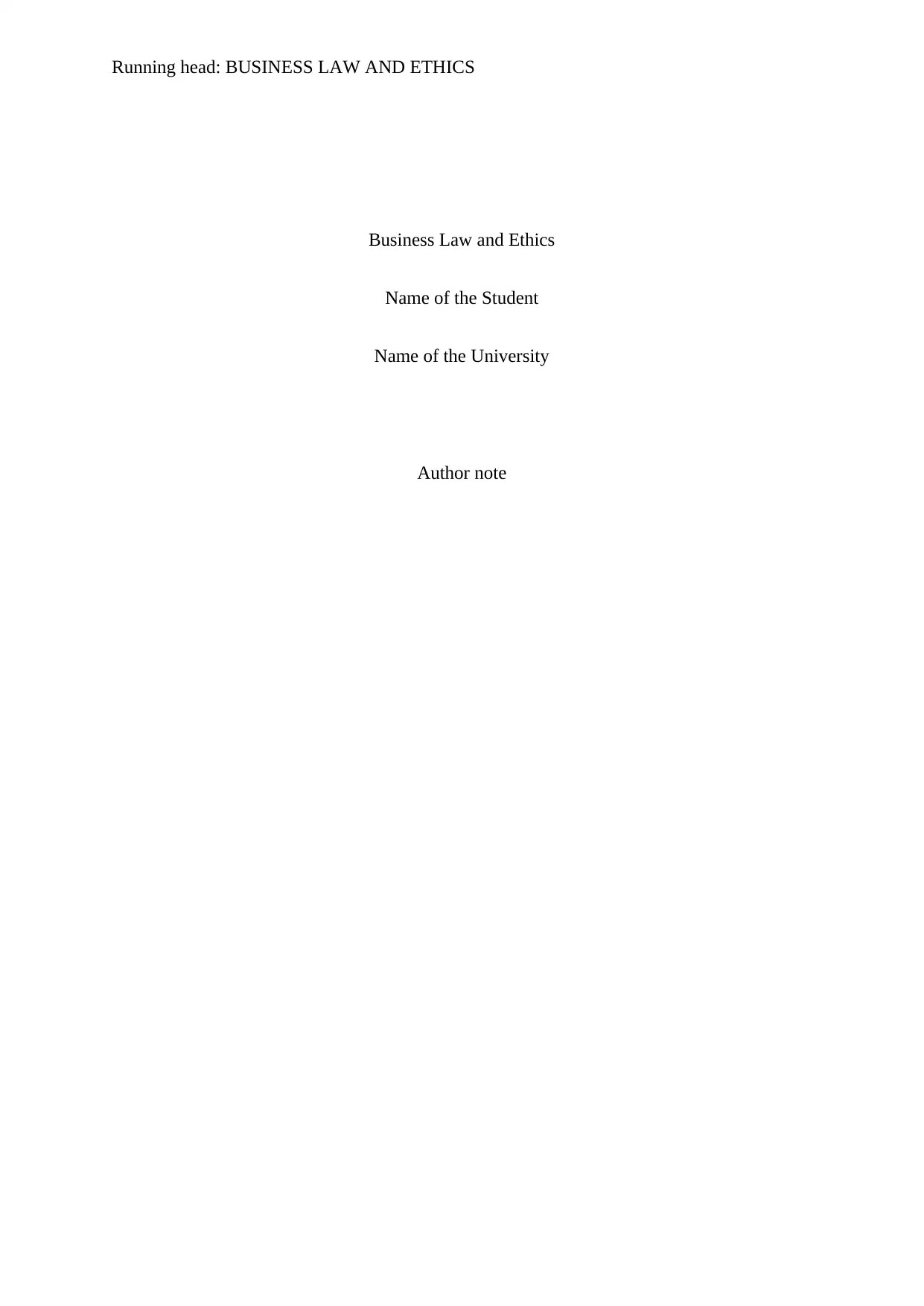
Running head: BUSINESS LAW AND ETHICS
Business Law and Ethics
Name of the Student
Name of the University
Author note
Business Law and Ethics
Name of the Student
Name of the University
Author note
Paraphrase This Document
Need a fresh take? Get an instant paraphrase of this document with our AI Paraphraser
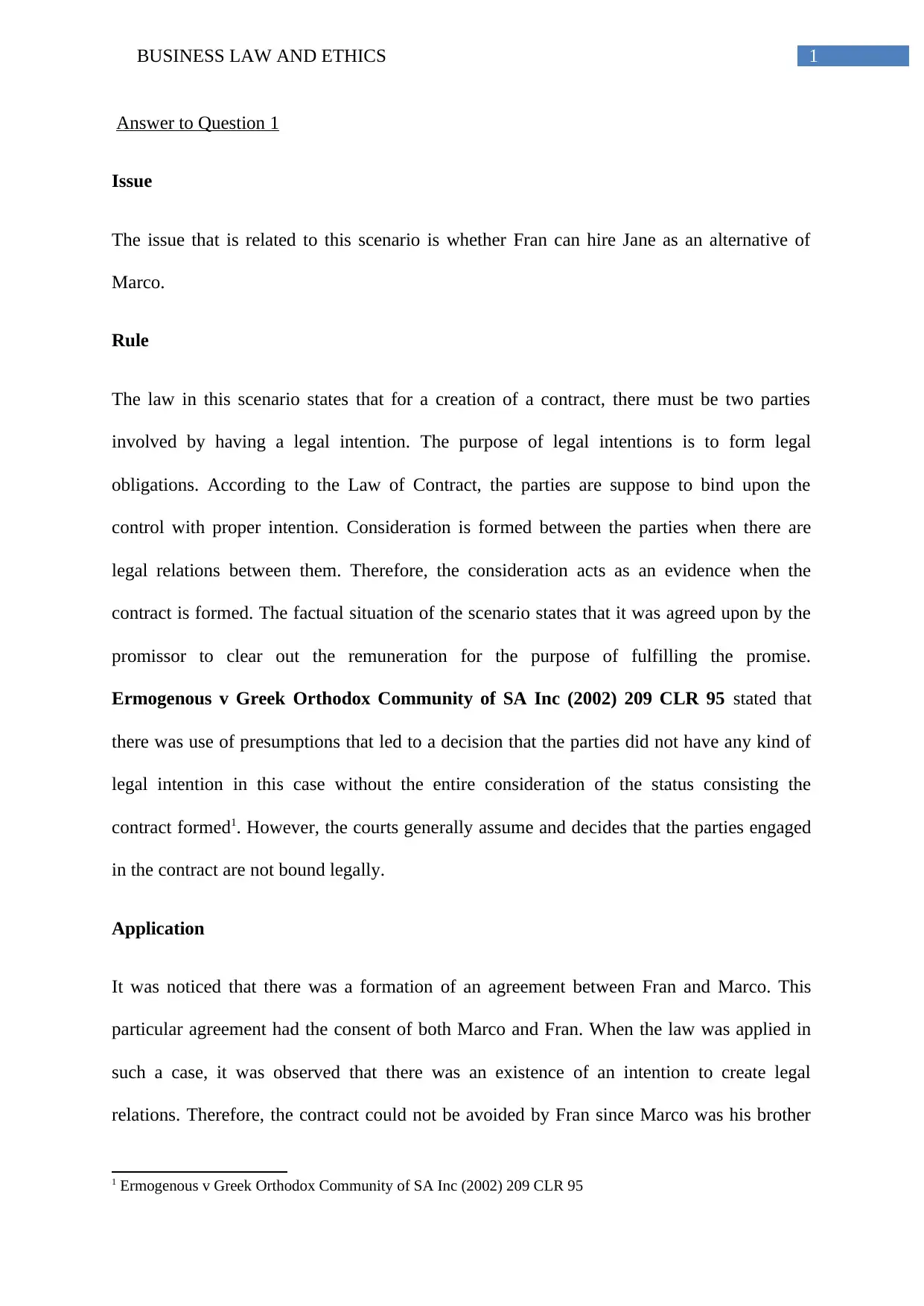
1BUSINESS LAW AND ETHICS
Answer to Question 1
Issue
The issue that is related to this scenario is whether Fran can hire Jane as an alternative of
Marco.
Rule
The law in this scenario states that for a creation of a contract, there must be two parties
involved by having a legal intention. The purpose of legal intentions is to form legal
obligations. According to the Law of Contract, the parties are suppose to bind upon the
control with proper intention. Consideration is formed between the parties when there are
legal relations between them. Therefore, the consideration acts as an evidence when the
contract is formed. The factual situation of the scenario states that it was agreed upon by the
promissor to clear out the remuneration for the purpose of fulfilling the promise.
Ermogenous v Greek Orthodox Community of SA Inc (2002) 209 CLR 95 stated that
there was use of presumptions that led to a decision that the parties did not have any kind of
legal intention in this case without the entire consideration of the status consisting the
contract formed1. However, the courts generally assume and decides that the parties engaged
in the contract are not bound legally.
Application
It was noticed that there was a formation of an agreement between Fran and Marco. This
particular agreement had the consent of both Marco and Fran. When the law was applied in
such a case, it was observed that there was an existence of an intention to create legal
relations. Therefore, the contract could not be avoided by Fran since Marco was his brother
1 Ermogenous v Greek Orthodox Community of SA Inc (2002) 209 CLR 95
Answer to Question 1
Issue
The issue that is related to this scenario is whether Fran can hire Jane as an alternative of
Marco.
Rule
The law in this scenario states that for a creation of a contract, there must be two parties
involved by having a legal intention. The purpose of legal intentions is to form legal
obligations. According to the Law of Contract, the parties are suppose to bind upon the
control with proper intention. Consideration is formed between the parties when there are
legal relations between them. Therefore, the consideration acts as an evidence when the
contract is formed. The factual situation of the scenario states that it was agreed upon by the
promissor to clear out the remuneration for the purpose of fulfilling the promise.
Ermogenous v Greek Orthodox Community of SA Inc (2002) 209 CLR 95 stated that
there was use of presumptions that led to a decision that the parties did not have any kind of
legal intention in this case without the entire consideration of the status consisting the
contract formed1. However, the courts generally assume and decides that the parties engaged
in the contract are not bound legally.
Application
It was noticed that there was a formation of an agreement between Fran and Marco. This
particular agreement had the consent of both Marco and Fran. When the law was applied in
such a case, it was observed that there was an existence of an intention to create legal
relations. Therefore, the contract could not be avoided by Fran since Marco was his brother
1 Ermogenous v Greek Orthodox Community of SA Inc (2002) 209 CLR 95
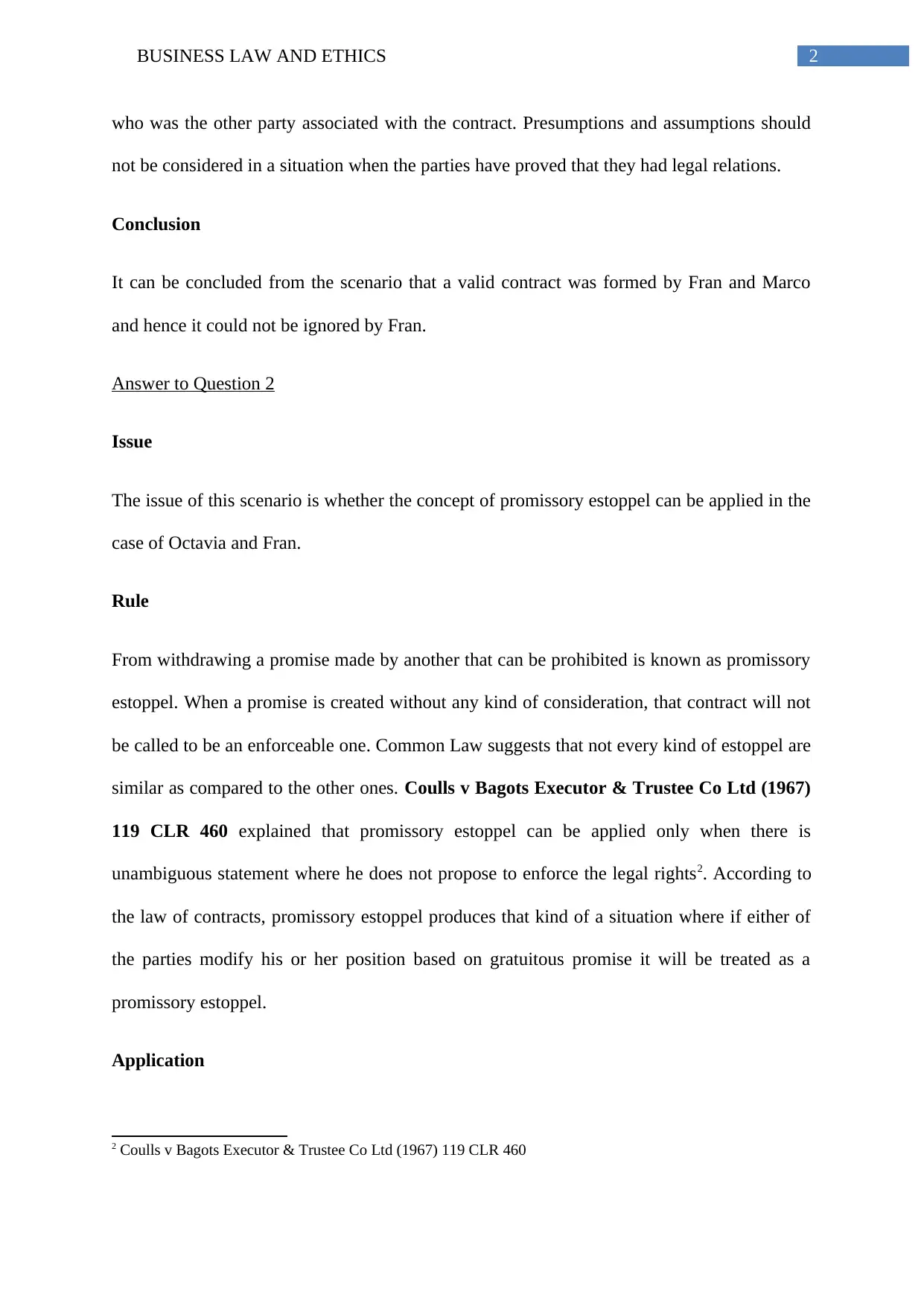
2BUSINESS LAW AND ETHICS
who was the other party associated with the contract. Presumptions and assumptions should
not be considered in a situation when the parties have proved that they had legal relations.
Conclusion
It can be concluded from the scenario that a valid contract was formed by Fran and Marco
and hence it could not be ignored by Fran.
Answer to Question 2
Issue
The issue of this scenario is whether the concept of promissory estoppel can be applied in the
case of Octavia and Fran.
Rule
From withdrawing a promise made by another that can be prohibited is known as promissory
estoppel. When a promise is created without any kind of consideration, that contract will not
be called to be an enforceable one. Common Law suggests that not every kind of estoppel are
similar as compared to the other ones. Coulls v Bagots Executor & Trustee Co Ltd (1967)
119 CLR 460 explained that promissory estoppel can be applied only when there is
unambiguous statement where he does not propose to enforce the legal rights2. According to
the law of contracts, promissory estoppel produces that kind of a situation where if either of
the parties modify his or her position based on gratuitous promise it will be treated as a
promissory estoppel.
Application
2 Coulls v Bagots Executor & Trustee Co Ltd (1967) 119 CLR 460
who was the other party associated with the contract. Presumptions and assumptions should
not be considered in a situation when the parties have proved that they had legal relations.
Conclusion
It can be concluded from the scenario that a valid contract was formed by Fran and Marco
and hence it could not be ignored by Fran.
Answer to Question 2
Issue
The issue of this scenario is whether the concept of promissory estoppel can be applied in the
case of Octavia and Fran.
Rule
From withdrawing a promise made by another that can be prohibited is known as promissory
estoppel. When a promise is created without any kind of consideration, that contract will not
be called to be an enforceable one. Common Law suggests that not every kind of estoppel are
similar as compared to the other ones. Coulls v Bagots Executor & Trustee Co Ltd (1967)
119 CLR 460 explained that promissory estoppel can be applied only when there is
unambiguous statement where he does not propose to enforce the legal rights2. According to
the law of contracts, promissory estoppel produces that kind of a situation where if either of
the parties modify his or her position based on gratuitous promise it will be treated as a
promissory estoppel.
Application
2 Coulls v Bagots Executor & Trustee Co Ltd (1967) 119 CLR 460
⊘ This is a preview!⊘
Do you want full access?
Subscribe today to unlock all pages.

Trusted by 1+ million students worldwide
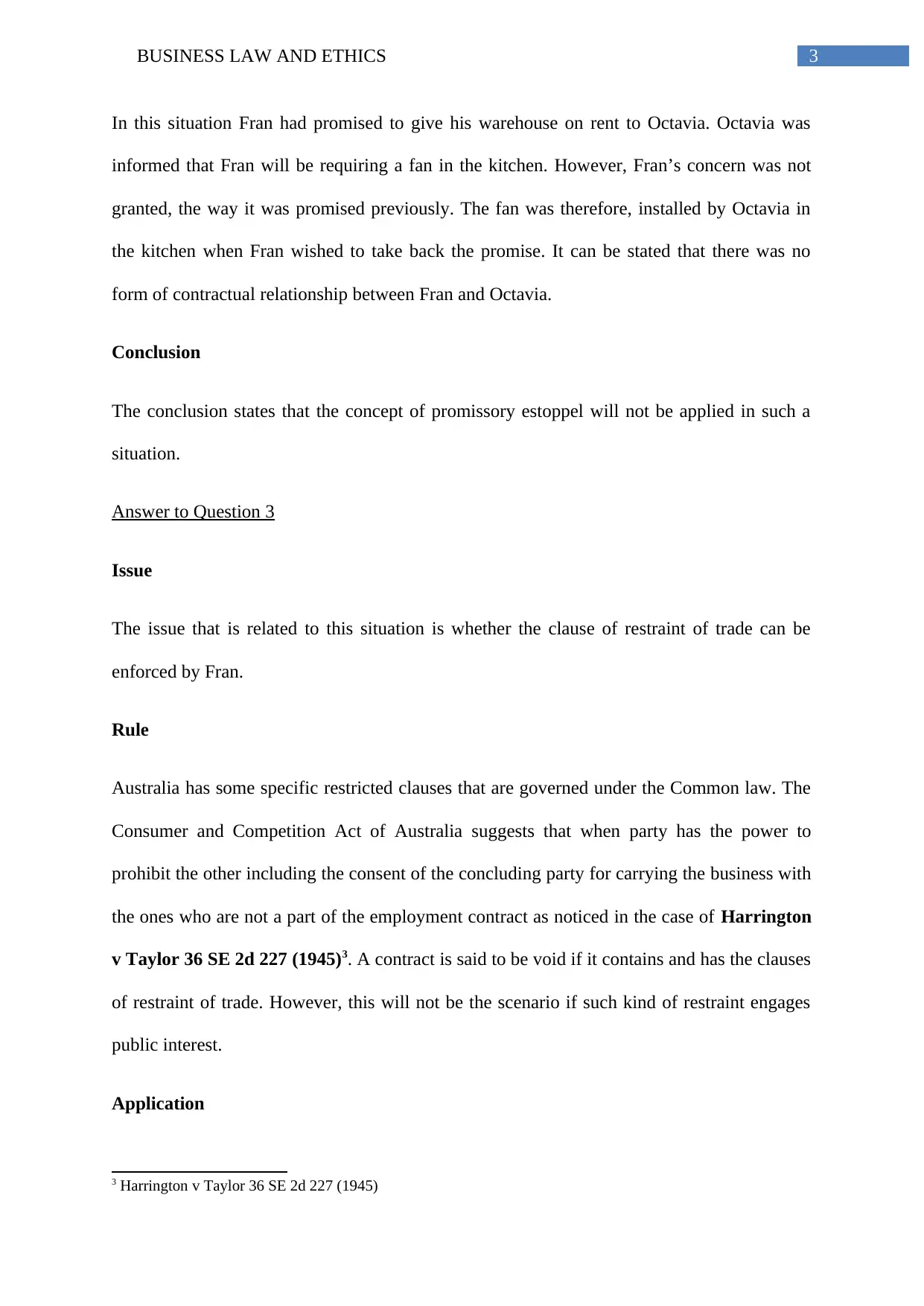
3BUSINESS LAW AND ETHICS
In this situation Fran had promised to give his warehouse on rent to Octavia. Octavia was
informed that Fran will be requiring a fan in the kitchen. However, Fran’s concern was not
granted, the way it was promised previously. The fan was therefore, installed by Octavia in
the kitchen when Fran wished to take back the promise. It can be stated that there was no
form of contractual relationship between Fran and Octavia.
Conclusion
The conclusion states that the concept of promissory estoppel will not be applied in such a
situation.
Answer to Question 3
Issue
The issue that is related to this situation is whether the clause of restraint of trade can be
enforced by Fran.
Rule
Australia has some specific restricted clauses that are governed under the Common law. The
Consumer and Competition Act of Australia suggests that when party has the power to
prohibit the other including the consent of the concluding party for carrying the business with
the ones who are not a part of the employment contract as noticed in the case of Harrington
v Taylor 36 SE 2d 227 (1945)3. A contract is said to be void if it contains and has the clauses
of restraint of trade. However, this will not be the scenario if such kind of restraint engages
public interest.
Application
3 Harrington v Taylor 36 SE 2d 227 (1945)
In this situation Fran had promised to give his warehouse on rent to Octavia. Octavia was
informed that Fran will be requiring a fan in the kitchen. However, Fran’s concern was not
granted, the way it was promised previously. The fan was therefore, installed by Octavia in
the kitchen when Fran wished to take back the promise. It can be stated that there was no
form of contractual relationship between Fran and Octavia.
Conclusion
The conclusion states that the concept of promissory estoppel will not be applied in such a
situation.
Answer to Question 3
Issue
The issue that is related to this situation is whether the clause of restraint of trade can be
enforced by Fran.
Rule
Australia has some specific restricted clauses that are governed under the Common law. The
Consumer and Competition Act of Australia suggests that when party has the power to
prohibit the other including the consent of the concluding party for carrying the business with
the ones who are not a part of the employment contract as noticed in the case of Harrington
v Taylor 36 SE 2d 227 (1945)3. A contract is said to be void if it contains and has the clauses
of restraint of trade. However, this will not be the scenario if such kind of restraint engages
public interest.
Application
3 Harrington v Taylor 36 SE 2d 227 (1945)
Paraphrase This Document
Need a fresh take? Get an instant paraphrase of this document with our AI Paraphraser
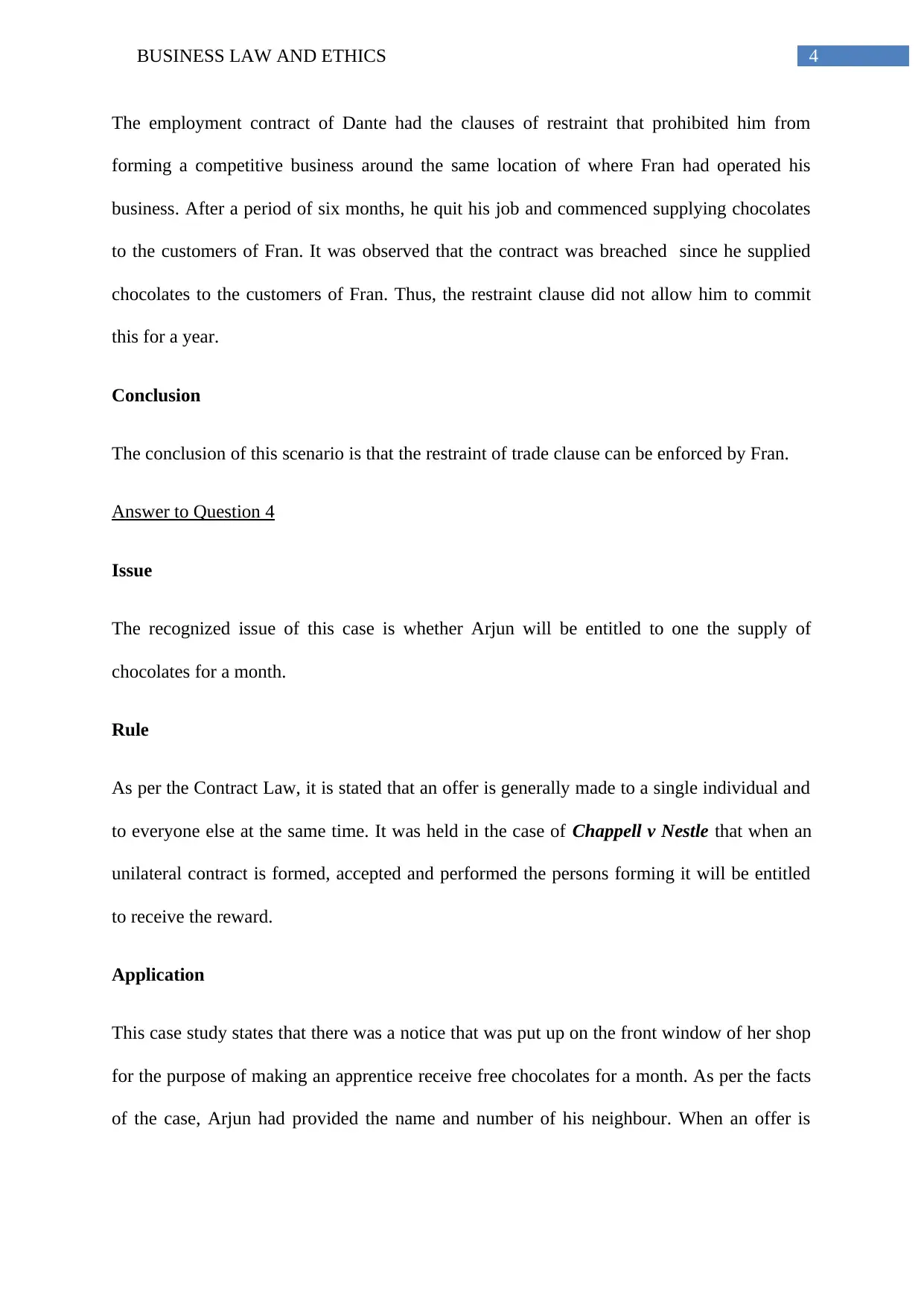
4BUSINESS LAW AND ETHICS
The employment contract of Dante had the clauses of restraint that prohibited him from
forming a competitive business around the same location of where Fran had operated his
business. After a period of six months, he quit his job and commenced supplying chocolates
to the customers of Fran. It was observed that the contract was breached since he supplied
chocolates to the customers of Fran. Thus, the restraint clause did not allow him to commit
this for a year.
Conclusion
The conclusion of this scenario is that the restraint of trade clause can be enforced by Fran.
Answer to Question 4
Issue
The recognized issue of this case is whether Arjun will be entitled to one the supply of
chocolates for a month.
Rule
As per the Contract Law, it is stated that an offer is generally made to a single individual and
to everyone else at the same time. It was held in the case of Chappell v Nestle that when an
unilateral contract is formed, accepted and performed the persons forming it will be entitled
to receive the reward.
Application
This case study states that there was a notice that was put up on the front window of her shop
for the purpose of making an apprentice receive free chocolates for a month. As per the facts
of the case, Arjun had provided the name and number of his neighbour. When an offer is
The employment contract of Dante had the clauses of restraint that prohibited him from
forming a competitive business around the same location of where Fran had operated his
business. After a period of six months, he quit his job and commenced supplying chocolates
to the customers of Fran. It was observed that the contract was breached since he supplied
chocolates to the customers of Fran. Thus, the restraint clause did not allow him to commit
this for a year.
Conclusion
The conclusion of this scenario is that the restraint of trade clause can be enforced by Fran.
Answer to Question 4
Issue
The recognized issue of this case is whether Arjun will be entitled to one the supply of
chocolates for a month.
Rule
As per the Contract Law, it is stated that an offer is generally made to a single individual and
to everyone else at the same time. It was held in the case of Chappell v Nestle that when an
unilateral contract is formed, accepted and performed the persons forming it will be entitled
to receive the reward.
Application
This case study states that there was a notice that was put up on the front window of her shop
for the purpose of making an apprentice receive free chocolates for a month. As per the facts
of the case, Arjun had provided the name and number of his neighbour. When an offer is
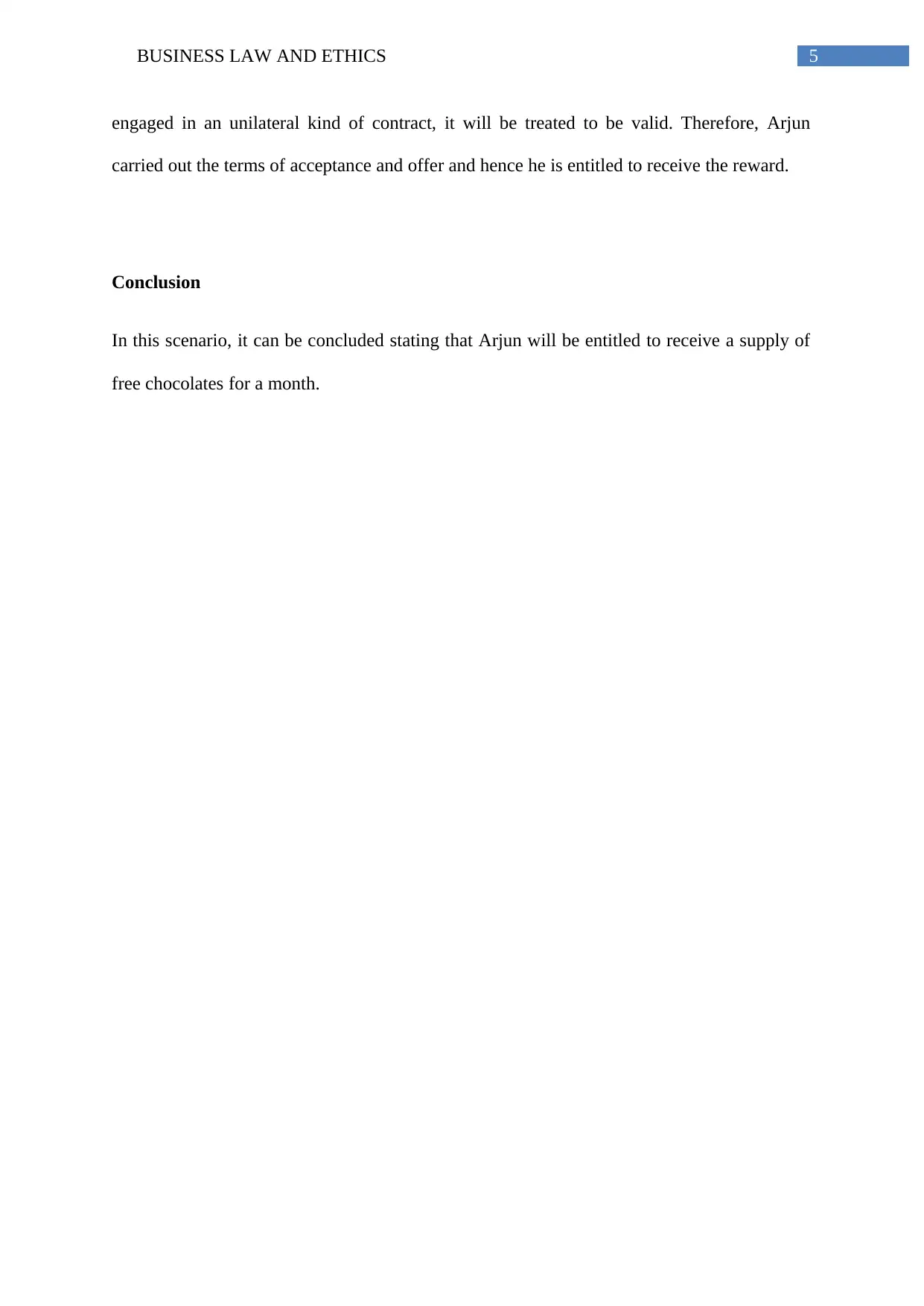
5BUSINESS LAW AND ETHICS
engaged in an unilateral kind of contract, it will be treated to be valid. Therefore, Arjun
carried out the terms of acceptance and offer and hence he is entitled to receive the reward.
Conclusion
In this scenario, it can be concluded stating that Arjun will be entitled to receive a supply of
free chocolates for a month.
engaged in an unilateral kind of contract, it will be treated to be valid. Therefore, Arjun
carried out the terms of acceptance and offer and hence he is entitled to receive the reward.
Conclusion
In this scenario, it can be concluded stating that Arjun will be entitled to receive a supply of
free chocolates for a month.
⊘ This is a preview!⊘
Do you want full access?
Subscribe today to unlock all pages.

Trusted by 1+ million students worldwide
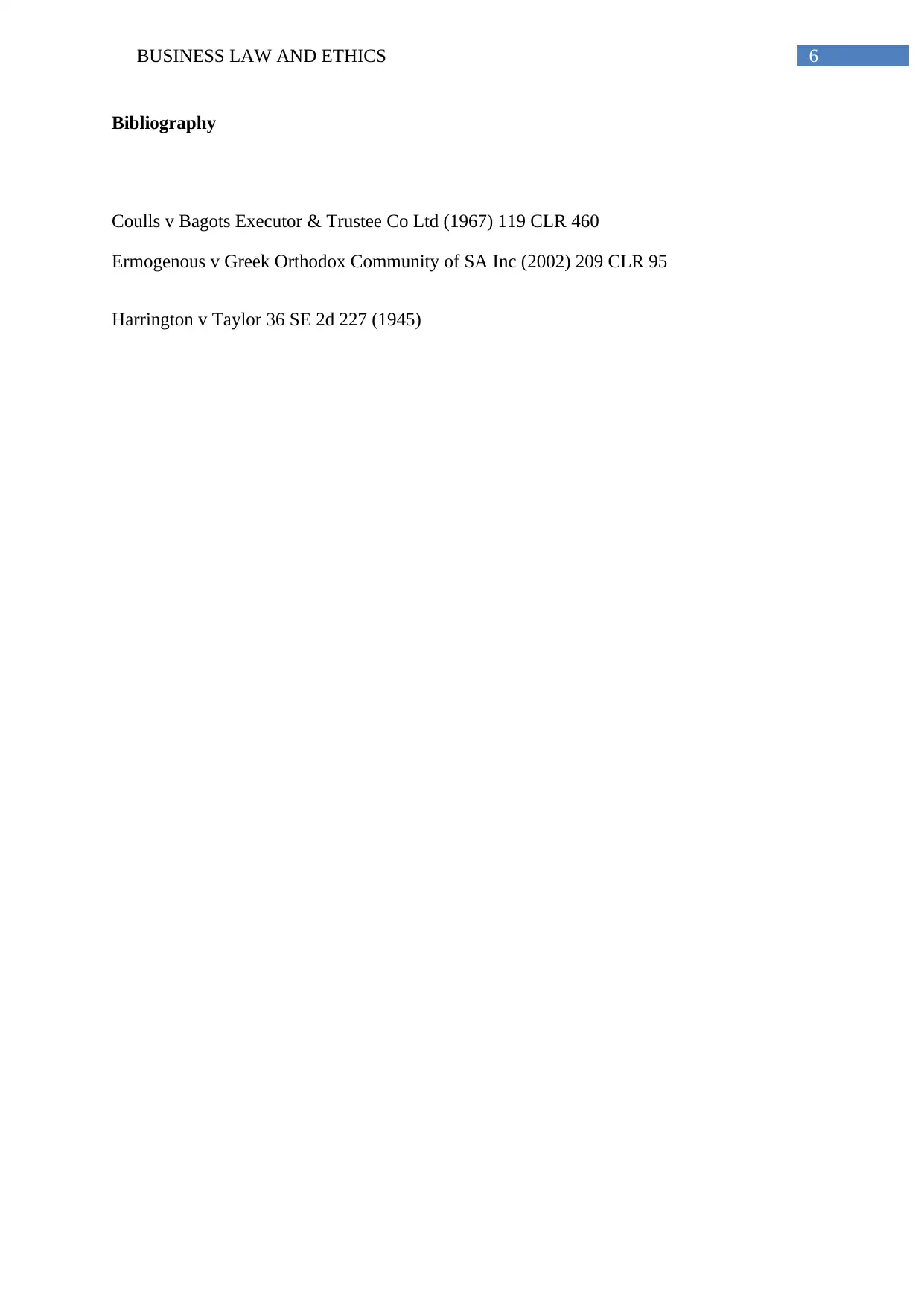
6BUSINESS LAW AND ETHICS
Bibliography
Coulls v Bagots Executor & Trustee Co Ltd (1967) 119 CLR 460
Ermogenous v Greek Orthodox Community of SA Inc (2002) 209 CLR 95
Harrington v Taylor 36 SE 2d 227 (1945)
Bibliography
Coulls v Bagots Executor & Trustee Co Ltd (1967) 119 CLR 460
Ermogenous v Greek Orthodox Community of SA Inc (2002) 209 CLR 95
Harrington v Taylor 36 SE 2d 227 (1945)
1 out of 7
Related Documents
Your All-in-One AI-Powered Toolkit for Academic Success.
+13062052269
info@desklib.com
Available 24*7 on WhatsApp / Email
![[object Object]](/_next/static/media/star-bottom.7253800d.svg)
Unlock your academic potential
Copyright © 2020–2026 A2Z Services. All Rights Reserved. Developed and managed by ZUCOL.

